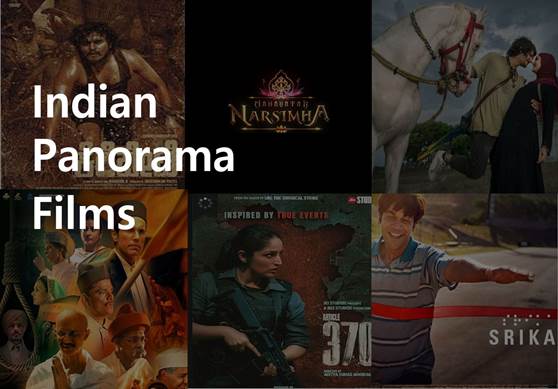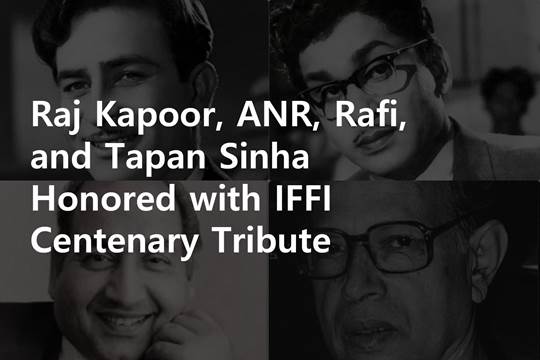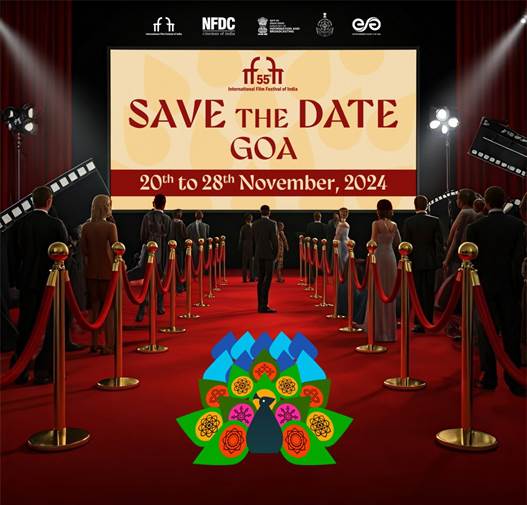55th International Film Festival of India: Cinema Without Borders
The vibrant hues of Goa’s landscape blend seamlessly with the glitz of cinema, where storytellers from every corner of the world converge to showcase their art. In just a few days, the 55th International Film Festival of India (IFFI) is set to open its doors in Panaji, Goa, once again transforming this coastal paradise into a lively hub of global culture, talent, and cinematic celebration. Film enthusiasts, industry leaders, and aspiring filmmakers, are drawn to IFFI not only for the screening of their films but also for the unique experience it offers- one that transcends cultural boundaries and invites people from all walks of life to appreciate the artistry of cinema.
Since its inception in 1952, IFFI has evolved into a premier platform for promoting films that celebrate the diversity of storytelling, culture, and creativity from around the world. The 2024 edition promises a compelling lineup, industry workshops, and a strong emphasis on accessibility and inclusivity. As India’s film industry makes strides toward becoming a major content creation hub globally, IFFI is more than just a festival, it is a showcase of India’s evolving role in international cinema, as well as a tribute to the power of film as a medium for social connection and change.
IFFI provides an opportunity for filmmakers to showcase their talents, reach new audiences, and share unique stories. Thanks to its competitive sections, networking events, and educational workshops, the festival has become an essential platform, especially for budding filmmakers. India’s film industry is already a vibrant ecosystem of diverse stories, genres, and techniques, and IFFI amplifies this by introducing Indian filmmakers to international markets and vice versa.
Highlights of the 55th IFFI: A Diverse Lineup of Films and Events
This year’s program features films across 16 curated segments, ensuring there’s something for everyone. From heartwarming dramas to intense documentaries, every corner of cinema is represented. Films making their national and international premieres at IFFI add to the excitement, allowing audiences a sneak peek at groundbreaking stories.
IFFI’s International Cinema section brings together a diverse array of culturally and artistically exceptional films from around the globe, maintaining its distinguished position by featuring the year’s best international films, carefully selected by esteemed film industry experts. The Indian Panorama, another premier segment of IFFI, will showcase 25 Feature Films and 20 Non-Feature Films during its 55th edition. The package of 25 Feature Films, including 5 films from mainstream cinema, has been chosen from a pool of 384 contemporary Indian entries, with the jury naming “Swatantrya Veer Savarkar” (Hindi) by Shri Randeep Hooda as the opening film of the Indian Panorama 2024. Further, 20 non-feature films will be screened in the Indian Panorama selected from a spectrum of 262 films. The package of Non-Feature Films exemplifies the capacity of emerging and established filmmakers to document, investigate, entertain and also reflect contemporary Indian values. The non-feature category will open with Ghar Jaisa Kuch (Ladakhi), directed by Harsh Sangani.

IFFI 2024 introduces a new award category, ‘Best Debut Director of Indian Feature Film,’ dedicated to emerging voices in Indian cinema. Five films by debut directors, representing India’s cultural and linguistic diversity, will be honoured at this year’s festival. These films not only showcase fresh perspectives but also bring unique narratives from regional India to a larger audience. Among the chosen films are Boong (Manipuri) directed by Lakshmipriya Devi, Gharat Ganpati (Marathi) directed by Navjyot Bandiwadekar, Mikka Bannada Hakki (Bird of a Different Feather- Kannada) directed by Manohara K, Razakar (Silent Genocide of Hyderabad- Telugu) directed by Yata Satyanarayana and Thanupp (The Cold- Malayalam) directed by Ragesh Narayanan, each offering a slice of life from different parts of India. By promoting these debut films, IFFI fosters new talent and reinforces the importance of regional voices in the national film landscape.

To celebrate Indian cinema’s rich heritage, IFFI 2024 pays centenary tribute to four legends: actor Raj Kapoor, director Tapan Sinha, Telugu film icon Akkineni Nageswara Rao (ANR), and singer Mohammed Rafi. Each has made a unique contribution to the industry, and the centenary tribute includes restored versions of their classic films. A special audio-visual presentation during the opening ceremony will highlight the journeys of these icons, providing newer audiences with insight into the lives and legacies that helped shape Indian cinema. The National Film Development Corporation (NFDC) has taken up the restoration work to bring these classics back to their visual quality.
A Place for Cultural Exchange: Australia as the Country of Focus
The Country of Focus at IFFI is a key segment dedicated to spotlighting the best contemporary films from a selected nation. Australia takes centre stage this year, celebrated for its contributions to global cinema through its innovative storytelling, diverse narratives, and unique cultural perspectives. IFFI will feature seven Australian films across a range of genres, including critically acclaimed dramas, powerful documentaries, visually captivating thrillers, and engaging comedies. These films reflect Australia’s rich cultural heritage, showcasing stories from both its indigenous communities and modern society. The partnership aligns well, as India and Australia have already formalised an Audio-Visual Co-Production Treaty, supporting deeper cinematic collaborations between the two countries.
Beyond Film Screenings: Workshops, Masterclasses, and the IFFI Red Carpet
In addition to screenings, IFFI hosts a range of events to deepen appreciation for the craft, including masterclasses, discussions, and hands-on workshops. The much-anticipated IFFI Red Carpet event offers a glimpse into the glitz and glamour of the film industry, featuring renowned actors, directors, and filmmakers. The red-carpet event brings the magic of cinema alive as stars and filmmakers gather to celebrate their work and share their passion for the art form. IFFI delegates will meet and connect with filmmakers, actors, and industry experts. In addition, IFFI once more brings back the 2024 editions of ‘Creative Minds of Tomorrow’, ‘Film Bazaar’ and ‘Cine Mela’, making the International Film Festival of India a ‘One Stop Shop’ for budding talents.

In a significant move towards inclusivity, IFFI’s venues have been equipped to ensure accessibility for everyone, including persons with disabilities (Divyangjan). Ramps, handrails, tactile pathways, braille signage, parking spaces, and other accessible features reflect the festival’s commitment to inclusivity, ensuring everyone can enjoy the magic of cinema. This is particularly relevant given India’s emphasis on creating barrier-free spaces for all, reflecting an inclusive approach in national and international events alike.
The Spirit of IFFI: A Brief History
Founded in 1952, the International Film Festival of India (IFFI) stands as one of Asia’s premier film festivals. Since 2004, Goa has been its permanent home, chosen for its spirit of openness and global appeal. Over the years, the festival has strengthened its reputation, earning accreditation from the International Federation of Film Producers’ Associations (FIAPF), placing it among the world’s most respected competitive film festivals. IFFI is organized annually by the Ministry of Information and Broadcasting, Government of India, in collaboration with the Entertainment Society of Goa, Government of Goa. While the Directorate of Film Festivals (DFF) in the Ministry of Information and Broadcasting had generally been spearheading the festival, consequent to the merger of film media units with the National Film Development Corporation (NFDC), NFDC has taken over the conduct of the festival. The event continues to serve as a cultural bridge, connecting audiences, filmmakers, and cinephiles from around the world while fostering a global appreciation for the art of filmmaking.
Conclusion
As the 55th International Film Festival of India unfolds in Goa, it represents more than just a collection of films; it embodies the spirit of unity, creativity, and shared human experience. At its core, IFFI is about bringing people together through the universal language of storytelling, offering a space where diverse voices can be heard and celebrated. This year’s festival, with its tributes to legends, celebration of emerging talent, and emphasis on inclusivity, is a testament to IFFI’s enduring legacy in the global film industry.

